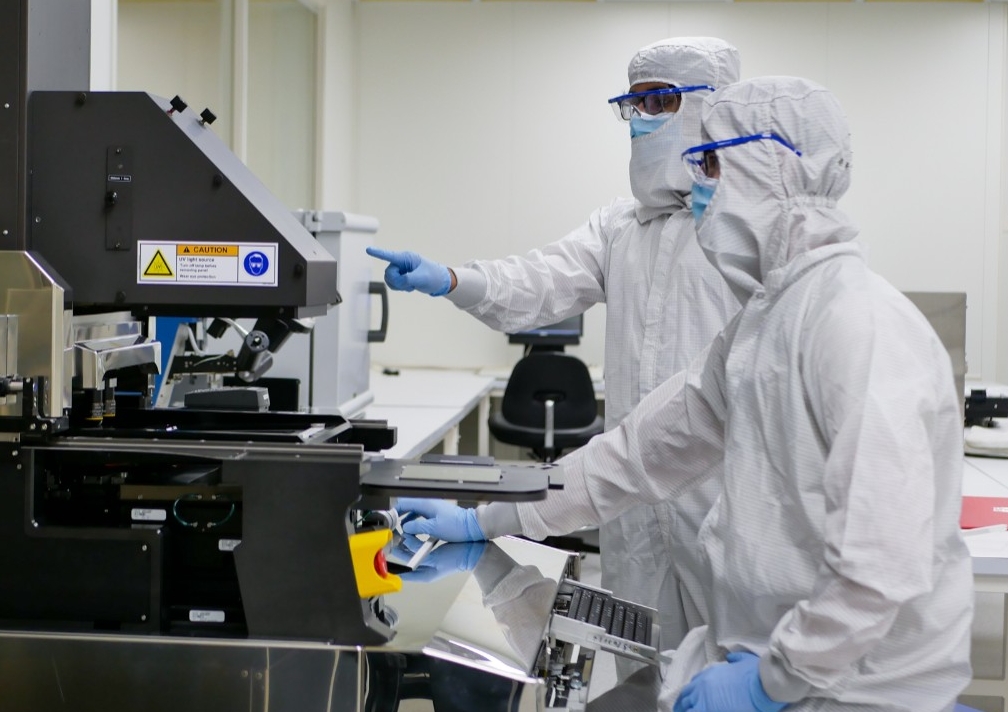Intel Corp. announced the first grants for semiconductor research and education to the University of Cincinnati as the company breaks ground on two new fabrication plants in Ohio.
Intel awarded an initial $1.1 million to support programs in UC's College of Engineering and Applied Science that will prepare UC graduates to meet the demands of Ohio's growing high-tech industry.

UC President Neville Pinto will attend Friday's groundbreaking for Intel's new semiconductor fabrication plants that are expected to spur Ohio's high-tech industry. Photo/Andrew Higley/UC Marketing + Brand
The grant will support the first year of funding for a new coalition UC has formed with 14 partnering colleges and universities called OASiS, the Ohio-southwest Alliance on Semiconductors and Integrated Scalable Manufacturing.
Led by UC engineering professor Rashmi Jha, the coalition will train students for future high-tech careers. She supervises UC's Clean Room where students learn to use state-of-the-art equipment in keeping with the industry's most demanding protocols.
Ohio is anticipating Intel will create 7,000 construction jobs leading to 3,000 new high-tech manufacturing and engineering jobs from its two planned fabrication plants beginning as early as next year. The growing high-tech sector in Ohio is expected to provide jobs not only for new graduates but also for people looking to start second careers.
To that end, UC and other member institutions will offer microcredit courses providing training on semiconductor equipment and processes, clean room techniques, safety protocols and other relevant skills. Jha said this will give UC the flexibility to address emerging demands for training.
"These jobs require extremely talented, skilled workers. We can develop a four-week course targeting particular training on equipment or process technology," Jha said.
Jha noted that UC has a storied history of innovation in computer technology. Vinod Dham, who helped develop the Pentium microchip, is a 1977 UC grad.
"We have a track record going back to the '70s," Jha said. "We already have a great curriculum to address the needs of the semiconductor industry."

UC College of Engineering and Applied Science students get firsthand experience working with semiconductor manufacturing in the Mantei Center's Clean Room. Photo/Corrie Mayer/CEAS Marketing
Intel announced $17.7 million to eight leading institutions, including UC, over three years. Intel expects this first iteration of the program to produce nearly 9,000 graduates for the industry and provide more than 2,300 scholarships over three years helping diversify the talent pipeline.
"The grant demonstrates the trust Intel is placing in UC to provide the real-world training and skills that Ohio's workforce will need. UC can influence the high-tech job market for years to come," said Gautam Pillay, associate dean for research in UC's College of Engineering and Applied Science.
Besides the NSF grant, Congress this year approved the CHIPS Act that dedicates $52 billion in incentives for chipmakers like Intel to build new plants in the United States.
"This is the most significant investment the federal government has made in this very critical industry," Pillay said.
Jha credited the contributions of UC College of Enginering and Applied Science faculty and staff Mary Nauman, Marc Cahay, John Emmert, Andrew Steckl, Chong Ahn, Yeongin Kim, Tao Li, Ranga Vemuri, Anastasios Angelopoulos, Sam Anand, Eric Nauman, P.K. Imbrie, Whitney Gaskins, Paula Lampley, Ron Flenniken, Jeffrey Simkins, Anthony Seta and Carol Ross.
Featured image at top: UC students get firsthand experience working with semiconductor manufacturing technology in the Mantei Center's Clean Room. Photo/Corrie Mayer/CEAS Marketing






